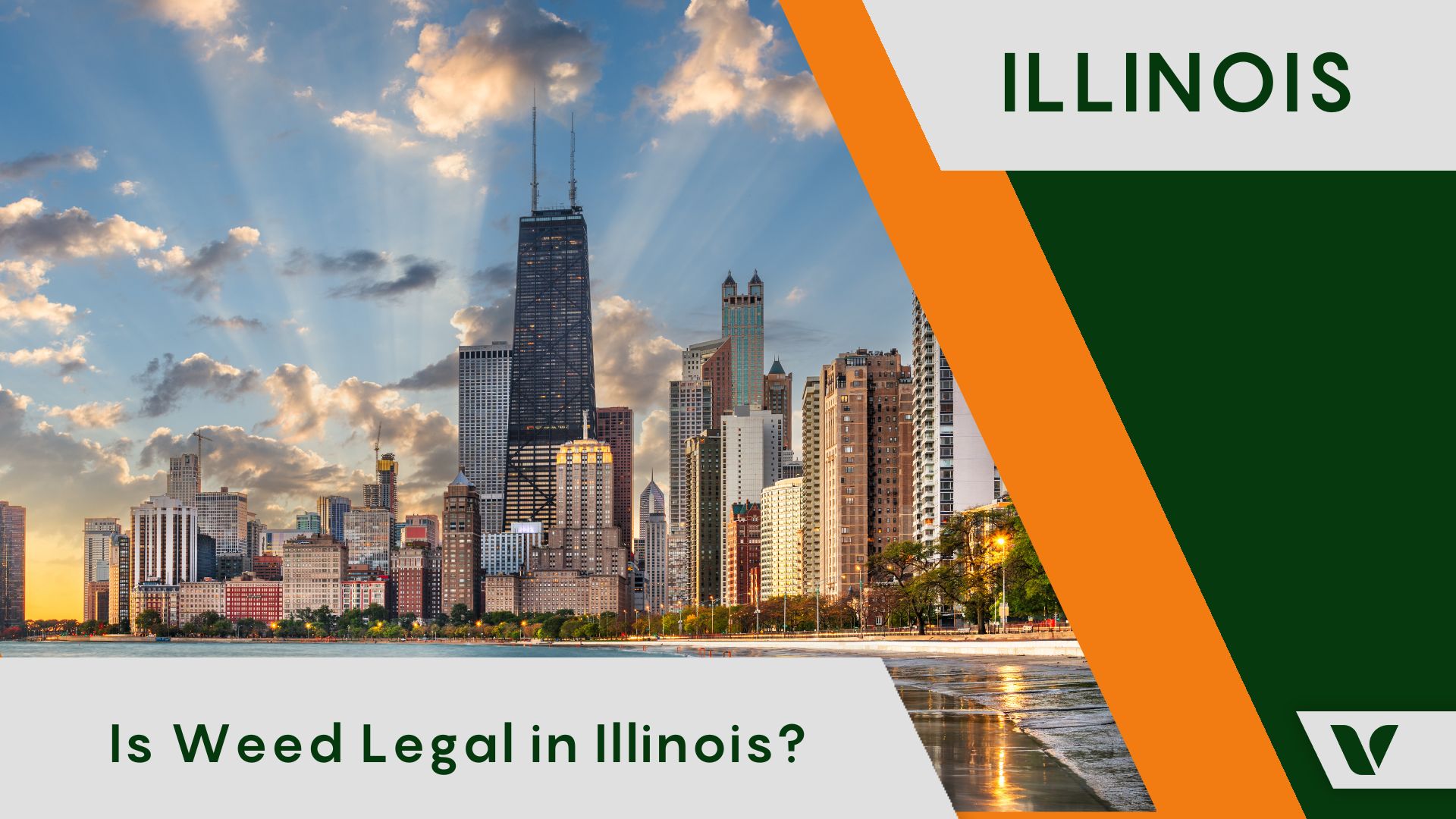The legalization of marijuana in Illinois is a topic of significant interest due to its implications on public health, criminal justice, and economic development. Illinois has legalized both medical and recreational cannabis, making it a frontrunner in cannabis reform.
Adults 21 and over can legally purchase and possess marijuana, with specific limits set to ensure responsible use. The state also allows the cultivation of cannabis for medical patients, which permits them to grow up to five plants in secured areas at home. However, recreational cultivation is still prohibited.
Illinois’s approach to cannabis is supported by figures such as Governor J.B. Pritzker, who has championed the legalization as a critical step towards social justice and economic prosperity. By regulating and taxing marijuana, Illinois aims to reduce illegal market activities while providing safe, reliable access to cannabis for both recreational users and medical patients.
Is Marijuana Legal in Illinois?
In Illinois, marijuana is legal for both recreational and medical use. Adults 21 years and older can legally purchase and possess up to 30 grams of cannabis flower, 5 grams of cannabis concentrate, and products containing no more than 500 milligrams of THC. Recreational cultivation at home is prohibited, except for medical patients who may grow up to five plants in a secured area. Illinois strictly prohibits the unlicensed sale of cannabis, emphasizing legal purchases through state-licensed dispensaries only.
The Illinois government, led by Governor J.B. Pritzker, has supported cannabis legalization as a step toward criminal justice reform and economic growth. Upon signing the legislation, Governor Pritzker expressed, “Legalizing adult-use cannabis brings an important and overdue change to our state, and it’s the right thing to do.” This move is seen as a progressive step to rectify past injustices associated with cannabis-related offenses and to boost state revenues through regulated sales.
Delta-8 vs. Delta-9 vs. Delta-10: Which is Legal in Illinois?
In Illinois, understanding the nuances between Delta-8, Delta-9, and Delta-10 THC is vital, as each cannabinoid offers distinct effects and possesses different legal statuses, encapsulated in the discussion around Delta-8 vs. Delta-9 vs. Delta-10 THC. Delta-9 THC is the most recognized form, known for its potent psychoactive effects, and is the primary compound in marijuana responsible for the high. It is fully regulated and legally available in Illinois through licensed dispensaries for both medical and recreational use.
Delta-8 THC, which is chemically different from Delta-9, offers a milder high. It is often chosen by those seeking similar benefits to Delta-9 but with less intensity, making it ideal for users who may experience anxiety with stronger THC types. Delta-10 THC, akin to Delta-8, provides an even milder effect, often described as uplifting and less sedating, making it suitable for daytime use without the typical psychoactive intensity.
In terms of legality in Illinois, while Delta-9 THC is regulated and legal when purchased from licensed dispensaries, Delta-8 and Delta-10 THC occupy a grey area. They must comply with both state and federal laws, necessitating that they be derived from hemp and contain less than 0.3% Delta-9 THC to be legal. Consumers are advised to understand the source and compliance of these products under the Delta-8 vs. Delta-9 vs. Delta-10 THC framework to navigate their legality effectively.
When was Weed Officially Legal in Illinois?
Weed became officially legal for recreational use in Illinois on January 1, 2020. This milestone in the state’s cannabis policy, established under the Illinois Cannabis Regulation and Tax Act, marked Illinois as the 11th state in the U.S. to legalize recreational marijuana. Under Illinois weed laws, adults aged 21 and over are permitted to purchase recreational cannabis from licensed dispensaries. The law explicitly outlines that individuals can buy up to 30 grams of cannabis flower, 5 grams of cannabis concentrate, and 500 milligrams of THC within cannabis-infused products.
Why You Should Get Your Medical Marijuana Card
Veriheal has satisfied millions of patients nationwide by giving them access to these benefits
- Larger purchase limits
- Peace of mind
- Enhanced legal protection
- Access to higher potency strains
- Save up to 25% on cannabis purchases
- Skip the line at the dispensary
However, regarding cultivation, the laws are more restrictive for recreational users. Personal cultivation of cannabis plants is prohibited unless the individual is a registered medical marijuana patient. Medical patients can grow up to five plants at home in a secured area out of public view.
How to Get Recreational Weed in Illinois
While recreational cannabis is readily available, obtaining a medical marijuana card for Illinois can enhance your cannabis purchasing experience significantly. Veriheal simplifies the process of acquiring a medical marijuana card, ensuring that you can access high-quality cannabis legally and with ease.
Although any adult over the age of 21 can purchase recreational cannabis, having a medical card is the only way to buy medical cannabis, which can offer different benefits and products not always available on the recreational market. For more detailed information and to explore Illinois weed dispensaries, visit our Illinois dispensaries page.
The benefits of having a Medical Marijuana Card in Illinois include access to a greater variety of cannabis strains and products, often at a lower cost due to significantly reduced taxes. Medical cannabis in Illinois is taxed at just 1%, compared to recreational marijuana taxes, which can range from 16% to as much as 31% depending on the product’s THC content. Moreover, medical patients can purchase and possess more cannabis — up to 2.5 ounces every 14 days, double the limit for recreational users.
Explore Illinois’s top cannabis dispensaries like The Herbal Care Center in Chicago, which boasts one of the most extensive product selections in the state, or NuMed Chicago, which is known for its high-quality products and knowledgeable staff. These dispensaries offer tailored experiences catering to medical cardholders and recreational users.
Additionally, Illinois is among the states that accept out-of-state medical cards, providing convenience and legal protections for visiting medical cannabis patients. This allows those with valid medical cards from other states to purchase and possess cannabis according to Illinois’s medical guidelines during their visit.
Frequently Asked Questions
Is it legal to smoke weed in Illinois?
Yes, it is legal to smoke weed in Illinois for adults aged 21 and over. However, consumption must occur in private residences or at locations specifically licensed for cannabis use; public smoking is prohibited.
Can you still go to jail for weed in Illinois?
While recreational marijuana is legal, possessing amounts over the legal limit, selling without a license, or driving under the influence of cannabis can lead to jail time.
What cities in Illinois have weed dispensaries?
Major cities in Illinois with weed dispensaries include Chicago, Aurora, Rockford, Joliet, and Naperville, among others, offering both medical and recreational cannabis.
Can you smoke weed on the sidewalk in Illinois?
No, smoking weed on the sidewalk or any other public space in Illinois is illegal. Cannabis use is restricted to private properties or designated areas.
Author, Share & Comments








